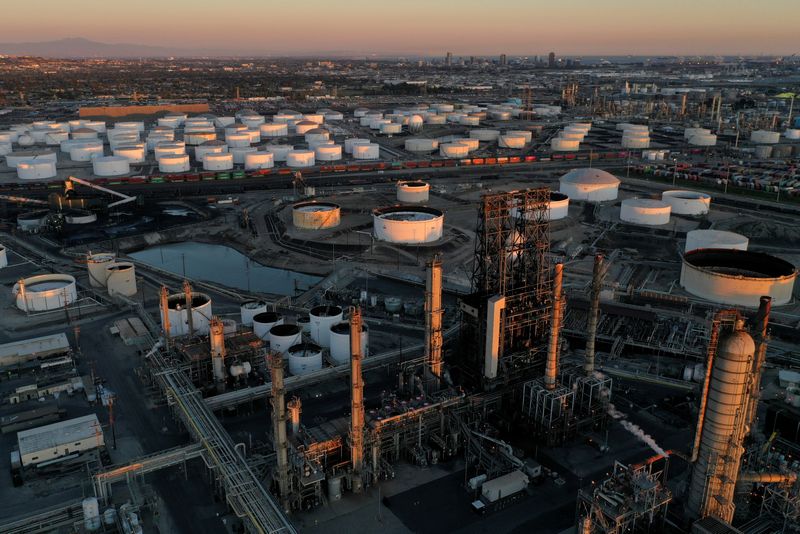Oil tumbles 9% on recession demand destruction fears
Reuters
Published Jul 04, 2022 09:14PM ET
Updated Jul 05, 2022 03:56PM ET

By Laila Kearney
NEW YORK (Reuters) - Oil plummeted about 9% on Tuesday in the biggest daily drop since March on growing fears of a global recession and lockdowns in China that could slash demand.
Global benchmark Brent crude settled at $102.77 a barrel, losing $10.73, or 9.5%. U.S. West Texas Intermediate (WTI) crude ended 8.2%, or $8.93, lower at $99.50 a barrel. There was no WTI settlement on Monday because of a U.S. holiday.
Both benchmarks logged their biggest daily percentage decline since March 9 and hit share prices of major oil and gas companies.
"We're getting creamed and the only way you can explain that away is fear of recession," said Robert Yawger, director of energy futures at Mizuho. "You're feeling the pressure."
Oil futures sank along with natural gas, gasoline and equities, which often serve as demand indicator for crude.
Meanwhile, mass COVID-19 testing in China stocked fears of potential lockdowns that threaten to deepen cuts to oil consumption.
Shanghai said it would begin new rounds of mass testing of its 25 million residents over a three-day period, citing an effort to trace infections linked to an outbreak at a karaoke bar.
"We're seeing some panic liquidation. Lots of nervousness," said Dennis Kissler, senior vice president for trading at BOK Financial.
Concerns that U.S. summer driving season demand would fall off after the Fourth of July holiday also appeared to weigh on the market, Kissler said.
The Dow Jones Industrial Average slipped about 1% while the S&P 500 Index fell less than 1%. U.S. prices for natural gas dropped 4.7%, heating oil fell about 8% and gasoline for delivery at New York Harbor fell 10.5%.
If a recession does hit, and takes a significant bite out of energy demand, more wild swings to the downside could be in store, said Andy Lipow, president of consultancy Lipow Oil Associates.
"The commodity market can be quite unforgiving when you go into a recession and supplies outstrip demand," Lipow said.
Meanwhile, safe-haven demand for U.S. Treasuries boosted the dollar by about 1.3%, which in turn weighed on greenback-denominated oil as it becomes more expensive for buyers holding other currencies. [USD/]
The euro tumbled to a two-decade low as data showed business growth across the euro zone slowed further last month, with forward-looking indicators suggesting the region could slip into decline this quarter as the cost of living crisis keeps consumers wary.
In South Korea, inflation hit a near 24-year high in June, adding to concerns about slowing economic growth and oil demand.
Supply concerns still linger, initially lifting WTI and Brent earlier in the session, due to expected output disruption in Norway, where offshore workers began a strike.
Late in the session, the Norwegian government intervened to stop the strike that had cut oil and gas output, a labour union leader told Reuters.

Saudi Arabia, the world's top oil exporter, raised August crude oil prices for Asian buyers to near record levels amid tight supply and robust demand.
Meanwhile, Russia's former President Dmitry Medvedev said a reported proposal from Japan to cap the price of Russian oil at about half its current level would mean less oil on the market and could push prices above $300-$400 a barrel.
Written By: Reuters
Trading in financial instruments and/or cryptocurrencies involves high risks including the risk of losing some, or all, of your investment amount, and may not be suitable for all investors. Prices of cryptocurrencies are extremely volatile and may be affected by external factors such as financial, regulatory or political events. Trading on margin increases the financial risks.
Before deciding to trade in financial instrument or cryptocurrencies you should be fully informed of the risks and costs associated with trading the financial markets, carefully consider your investment objectives, level of experience, and risk appetite, and seek professional advice where needed.
Fusion Media would like to remind you that the data contained in this website is not necessarily real-time nor accurate. The data and prices on the website are not necessarily provided by any market or exchange, but may be provided by market makers, and so prices may not be accurate and may differ from the actual price at any given market, meaning prices are indicative and not appropriate for trading purposes. Fusion Media and any provider of the data contained in this website will not accept liability for any loss or damage as a result of your trading, or your reliance on the information contained within this website.
It is prohibited to use, store, reproduce, display, modify, transmit or distribute the data contained in this website without the explicit prior written permission of Fusion Media and/or the data provider. All intellectual property rights are reserved by the providers and/or the exchange providing the data contained in this website.
Fusion Media may be compensated by the advertisers that appear on the website, based on your interaction with the advertisements or advertisers.